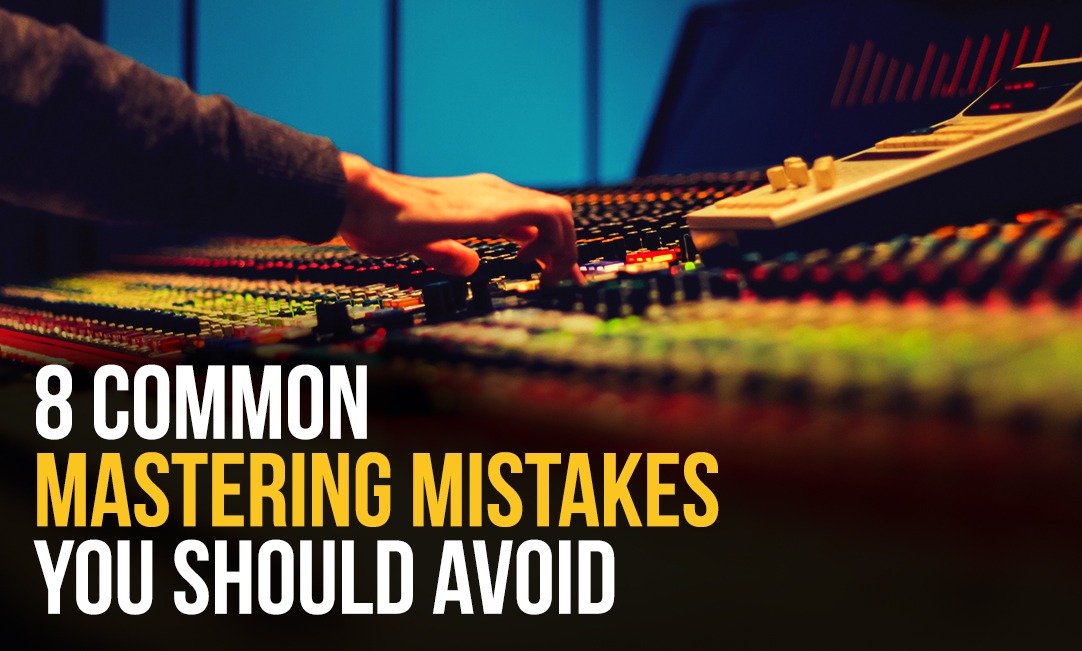8 Common Mastering Mistakes you should avoid

Want to master your song?Definitely yes!
But beware of the mastering mistakes that can do more harm than good to your song. Check out these 8 common mastering mistakes. Avoid them and reign the million hearts!
1. Failure to recognize the difference between "The Mix" and "The Master"
Let me begin with an illustration. While redecorating a room, we transfer our furniture after the paint settles; else the things become messy. The same happens, if we master a mix without giving time or without realizing the difference in production quality that comes with mastering. Mastering is a separate entity; a separate skill and therefore it must be treated differently. During mastering your mixes, make sure to provide enough time between the overall mix and the mastering process. You should avoid mastering a mix on the same day that you finished it because you'll most likely be making decisions on the spur of the moment that can cloud your judgment.
2. Obsessive and aggressive processing during Mastering
Too much processing during the mastering phase, reveals you're a novice in mastering skills. While mastering, you should process the mix to an extent that would help to enhance the mix rather than alter it. Look for inconsistent sounds such as noise, distortions, misplaced vocals, etc; and remove them with the help of some devices or software such as noise gate. If you spot some mixing issues, go back to the mix to fix the issue instead of struggling to fix it during mastering.
3. All-in-One Plug-in Makes the Job Easy
No doubt, plug-ins are valuable mastering applications that help to make music production an intuitive and automated process but relying completely on them is again one of the biggest mastering mistakes. Mastering entails fine-tuning songs to achieve a cohesive flow. But if you try to use everything that your plug-in has to offer, the final product may be disappointing. When you enter the mastering stage, hear intentionally to find out what is needed to be amplified to improve the production. Use the plug-ins only to enhance rather than distract from the master's depth and texture.
4. Allowing your master to go in the wrong direction
It's vital to devise a solid strategy as soon as you begin mastering the tracks on your own. Simply tinkering and changing things, is not mastering. Pay attention to the mix carefully to find the faults. Make a thorough examination of any gaps or flaws that stand out to you. After you've completed your study, you'll need to assemble and hear genre-specific source tracks to guide the master in the appropriate path. As you progress, level match and source check your master, to ensure that it is developing.
5. Absence of Stereo and Mid-Side Balance
Mastering is to make all the tracks of your song sound, unified yet distinct. However, one of the most typical mastering blunders is overlooking the significance of stereo balance. Your master gets no credit due to the distorted volume difference between the Left and Right channels. Every aspect of your recording must be crystal clear and adjusted. Always double-check that the LR channel's loudness differential isn't too large. To achieve a flawless master, let not all the components be concentrated in a narrow master. So, pay close attention to changing the master's width. Here, the Stereo Enhancer plugin helps you.
6. Loudness works
Loudness war is a thing of the past. So don't concentrate your energy to make the song, sound too aggressive and loud. So, try to work on dynamic range and conform to new LUFS requirements, instead of RMS and peak. This results in the more spacious sounding masters.
7. Monitoring levels too high during Mastering
The level of our monitors fluctuates about a little throughout tracking and mix workflows, from whisper-quiet to eye-watering loud, but in mastering, you should handle your monitoring volume in a more "set it and forget it" method. If you keep increasing the volume of your monitors, your ears will believe that louder is better. To master it, you must have a sensible strategy for the monitor. In essence, use your monitors to your benefit or they will make self-mastering nearly impossible, similar to trying to strike a changing target.
8. Getting the Vocal Placement Wrong
The right placement of vocals is crucial to a decent soundtrack. The vocals should be clear and project well. The voices in the final master, on the other hand, are frequently either hidden or too out there. Over-compression is one of the reasons. Whether the vocal is in the center, front, or back of the track, there is no single right answer. The idea is for the listeners to have the best possible experience with the singing. Suggest a new variation of vocal position to find the appropriate arrangement so that the words and voices stand out in the mix.
Conclusion
Mastering is an intricate process, and pursuing it on your own frequently results in mistakes. Here, is some friendly advice. Focus on creating outstanding compositions, and let the talented engineers deal with the technical aspects. Avail of mastering service from a professional recording studio that can enhance the quality of sound. Don't worry about the traveling pain and expense as UNION Recording Studio offers you the best online mastering service. Send your recorded song through email and our talented team will do the needful.